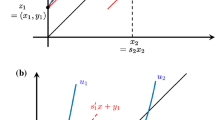Abstract.
We develop an approach which escapes Arrow’s impossibility by relying on information about agents’ indifference curves instead of utilities. In a model where agents have unequal production skills and different preferences, we characterize social ordering functions which rely only on ordinal non-comparable information about individual preferences. These social welfare functions are required to satisfy properties of compensation for inequalities in skills, and equal access to resources for all preferences.
Similar content being viewed by others
Author information
Authors and Affiliations
Corresponding author
Additional information
We thank participants of the SCW conference in Vancouver (July 1998), of workshops at Cergy and Osnabrück, and of seminars at Tokyo (Hitotsubashi U.) and Caen. We are also grateful to an Associate Editor and two referees for their very helpful comments. Financial Support from European TMR Network FMRX-CT96-0055 is gratefully acknowledged.
Rights and permissions
About this article
Cite this article
Fleurbaey, M., Maniquet, F. Fair social orderings when agents have unequal production skills. Soc Choice Welfare 24, 93–127 (2005). https://doi.org/10.1007/s00355-003-0294-y
Received:
Accepted:
Issue Date:
DOI: https://doi.org/10.1007/s00355-003-0294-y




